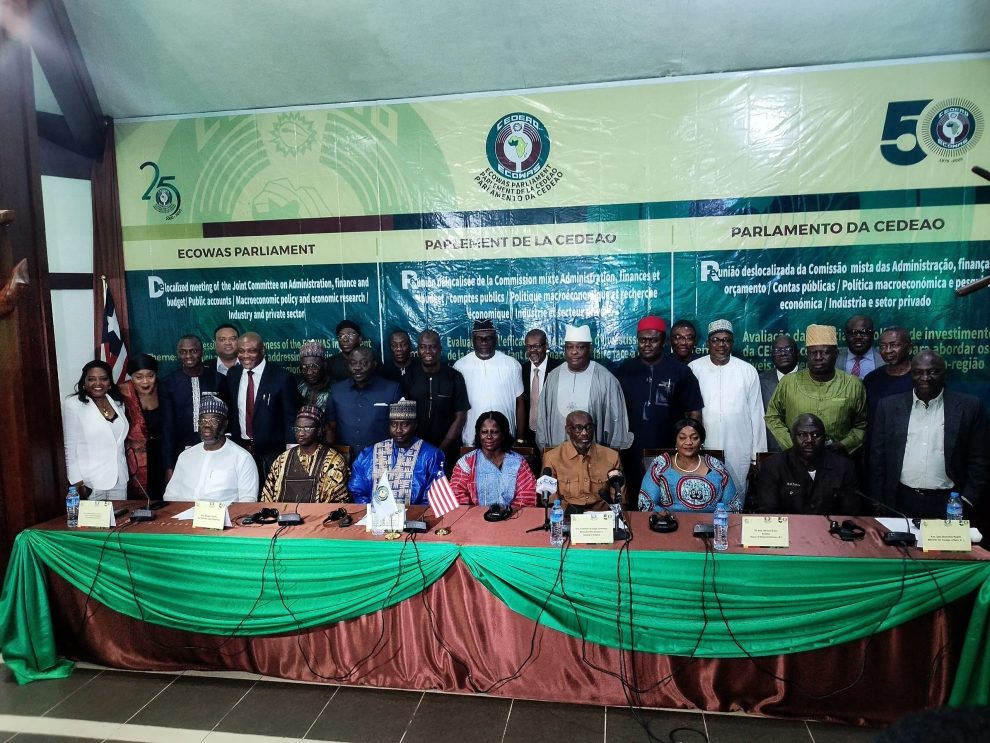Monrovia, Liberia – West Africa’s ECOWAS Parliament is intensifying its focus on the sub-region’s “daunting challenge” of unemployment, particularly among its youth. As a joint committee meeting opened today, Monday, June 16, 2025, in Monrovia, Liberia, the Speaker of the Parliament, Memounatou Ibrahima delivered a stark message: despite recent economic growth, rising joblessness threatens social cohesion and regional integration.
The Speaker who was represented by Billa Tunkara, 4th Deputy Speaker of the ECOWAS Parliament, highlighted alarming statistics, noting that unemployment rates in ECOWAS countries average around 15%, with youth unemployment reaching up to 30% in some nations. “If left unaddressed, it could undermine the prosperity we aspire to achieve,”
The Policy Challenge: Translating Growth into Jobs
The ECOWAS Parliament’s meeting is centred on “Assessing the Effectiveness of the ECOWAS Investment Policy (EIP) as a Panacea for Addressing the Rising Levels of Unemployment.” The EIP was adopted with key pillars including fostering a conducive investment climate, promoting regional market integration, enhancing investment in high-employment sectors like agriculture and manufacturing, supporting Small and Medium Enterprises (SMEs), and leveraging Public-Private Partnerships (PPPs).
While there has been “encouraging progress” in investment flows, including Foreign Direct Investment (FDI), and some policy reforms across member states, the impact on overall employment levels remains “relatively modest.”
Mr. Tunkara pointed to several critical challenges impeding the full realisation of investment potential:
- Limited Institutional Capacity: Many member states lack the robust institutional frameworks needed for effective policy implementation.
- Inadequate Infrastructure: Poor infrastructure remains a significant barrier, slowing economic diversification and efficient investment.
- Limited Access to Finance: SMEs, crucial engines of job creation, often struggle to access affordable finance, limiting their growth and ability to scale.
- Mismatch of Investment: Investments have not consistently targeted high-employment sectors, leading to a disconnect between capital inflows and actual job creation.
- Uneven Distribution: Investments are often unevenly distributed across the sub-region, exacerbating disparities in development and job opportunities.
- Quality of Jobs: Even where jobs are created, they often fall short of standards for “decent work,” highlighting a need for more targeted strategies.
Path Forward: Strategic Enhancements for Job Creation
To transform the ECOWAS Investment Policy into a truly effective instrument against unemployment, the Parliament is calling for significant strategic enhancements:
- Targeted Investment: Prioritise aligning investment flows with employment-intensive sectors such as agriculture, agro-processing, light manufacturing, and services, placing job creation at the core of all investment strategies.
- Stronger Institutions: Strengthen the institutional capacity of both national and regional bodies to effectively monitor, implement, and enforce investment policies, creating a more predictable environment for investors.
- Access to Finance for SMEs: Facilitate access to finance through regional funds, credit guarantee schemes, and specific incentives for SMEs and entrepreneurs, recognising their pivotal role in innovation and employment.
- Infrastructure Development: Continue investing in critical infrastructure and connectivity to reduce operational costs, improve logistics, and enhance market access, making the region more appealing to investors.
- Skills Development: Place greater emphasis on skills development and entrepreneurship, aligning education and vocational training with market needs and empowering youth and marginalised groups.
- Deepened Regional Cooperation: Harmonise regulations and eliminate redundancies to foster a more integrated investment space, thereby facilitating cross-border investments and maximising the region’s collective potential.
- Private Sector Engagement: Foster an environment that allows entrepreneurs to thrive, leveraging public-private partnerships and involving civil society and international organisations to mobilise resources and expertise.
The Speaker urged all participants to engage openly and constructively, viewing the meeting as “not merely as an advocacy exercise but as a strategic platform to recommit ourselves to transforming policies into tangible realities, creating jobs, empowering youth, and fostering resilient economies across our beloved sub-region.”





Add Comment